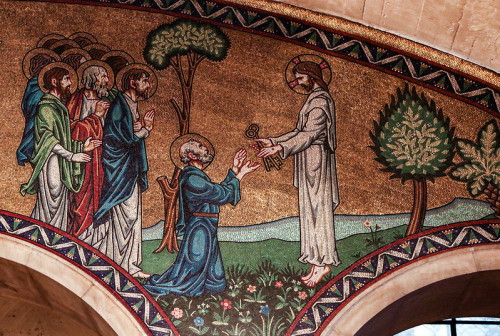HOMILY for the 19th Wed per annum (I)
Ezekiel 9:1-7,10:18-22; Ps 112; Matt 18:15-20

“I tell you solemnly, whatever you bind on earth shall be considered bound in heaven; whatever you loose on earth shall be considered loosed in heaven.” (Mt 18:18) Most Catholics will be familiar with this sentence, but not in this context. The version we’re used to comes two chapter earlier in St Matthew’s Gospel, and it is spoken specifically to St Peter, and it is preceded by these words: “I will give you the keys of the kingdom of heaven, and whatever you bind on earth…” (cf Mt 16:19) The English translation also disguises another difference that would be obvious in the Greek, or indeed, in any language that has a strongly distinguished second person plural. For Jesus says in today’s Gospel: “Whatever you all bind on earth shall be considered bound in heaven; whatever you all loose on earth shall be considered loosed in heaven.” So, although at first it sounds like Jesus is repeating himself, here he is addressing the whole company of apostles, and then, more generally, us, the Church, the whole company of the baptised. And he gives to the apostles and to every Christian, including you and me, the kind of authority he gave to St Peter: the authority to bind and to loose in heaven and on earth.
What does this mean? Well, to begin with, let’s be clear about what it does not mean. It doesn’t mean that Christians have a licence to do whatever they like, nor can we declare the rightness or wrongness of moral issues as we like. Rather, we are called to judge moral issues as God likes, according to God’s wisdom and justice and goodness. For all authority belongs to Christ first of all, and he has entrusted the power to bind and loose to his Church which is his Body on earth. As such, we act on trust, in union with Christ, and our exercise of this power to bind and loose is a manifestation of our communion with Christ, a sign that we belong to him, and that his Holy Spirit is alive and active in his Church.
In the Jewish tradition, the term “bind and loose”, which means to forbid or permit something, was entrusted to the priests of the Jewish Temple and the judges of Israel. Now, Christ is the Great High Priest, and he is also the Just Judge of all peoples. As such, it is his right and his responsibility to bind and to loose, to adjudicate on whether or not an act conforms to the Law. However, this isn’t simply the Law of Moses or the Torah, as such, but it is Law of Christ, which is Charity. Because Christ is perfect in his loving, so he shows us by his own example of sacrificial love on the Cross, how to perfectly accomplish the law of love.
The Church, likewise, is called to bind and loose, to judge the world, through love. If we are to do this we must, first of all, like Christ, be a visible and manifest sign of divine self-giving love. For although today’s Gospel is about the giving of a certain power and authority to the Christian people, we know that any good exercise of this power and authority always makes personal demands of us; power demands responsibility, and the use of authority is at the service of a particular duty. As God’s holy people, Christ has given us Christians the responsibility of sanctifying the world, of redeeming it for Christ, and thus we have the duty of showing it God’s way of love and of peace. As Christ told us: “This is my commandment, that you love one another as I have loved you.” Love, therefore, is our standard by which we loose and bind on earth, and heaven too shall judge us according to love. As St John of the Cross said: “At the evening of life, we shall be judged on our love.” (cf CCC 1022)
intesperavi reblogged this from lawrenceop
jurakan reblogged this from lawrenceop
nonigurl liked this
lawrenceop posted this